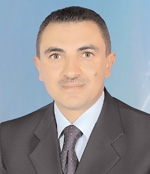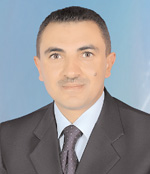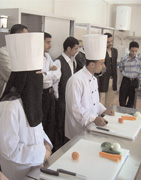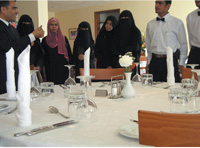
Local institute seeks autonomy from government [Archives:2008/1133/Reportage]
February 28 2008
 |
 |
 |
 |
In order for it to work effectively, the administration of the National Hotel and Tourism Institute, or NAHOTI, is calling for autonomy from the Yemeni government. Officials at the institute say being dependent upon the state will cause their institute to fail, just as a similar institute in the city of Aden failed. Ismail Al-Ghabri interviewed Khalid Al-Du'ais, dean of NAHOTI.
With a master's in tourism marketing from the Netherlands, NAHOTI Dean Khalid Mohammed Saleh Al-Du'ais previously worked at the Ministry of Tourism and the General Authority for Tourism Development. His last post was executive manager of the Ministry of Tourism's tourism promotion board. Before that, he held various positions at the ministry, such as the department's presidency, as well as administration at varying levels, including president of research and studies, public relations manager for tourism promotion and head of the national project to promote tourism, which no longer operates.
Excerpts:
Who are your administrative board members?
We don't have an administrative board yet, but there is a Technical Committee presided over by the minister of Technical and Vocational Training (TVT). Committee members include Tourism Minister Nabil Al-Faqih, Alwan Al-Shaibani Director of Universal Group, Hotel Union Chairman Yahya Saleh, the head of the Yemen Association for Travel and Tourist Agencies (YATTA), the TVT Ministry's manager of financial affairs, the head of NAHOTI and the head of the Vocational Training Fund.
This Technical Committee is responsible for running the institute, but once autonomy is decreed, it will become an administrative board, which will be more efficient and ensure better financing because the private sector won't provide us funds so long as we're under state control.
Once we're autonomous, our administration will be qualified, honest and transparent and our records will be open to everyone. Within the next two weeks, a tender will be established to administer and run our subsidiary three-star hotel, which is in the same building and financed by the European Union.
What's important about this hotel is that the institute will benefit from its input and output by training students for free and increasing our teachers' competency, in addition to benefiting from the operating revenues.
Our institute's 2008-2012 plan takes into consideration that it gradually will be self-financed with no need for the Finance Ministry or the local council. All we need from them is to provide us staff and strategic investment projects or a new building, while the institute will cover operational costs, if what we're seeking is accomplished.
Does the institute plan to open branches once autonomy is granted?
While the Aden institute was the first in Yemen, it isn't autonomous, as it's also state-controlled, which is why it failed.
The TVT Ministry now plans to construct four institutes in Hadramout, Hodeidah, Damt and Abyan and, as far as we know, these institutes also are calling for autonomy.
The minister of the TVT has promised us that if our institute is granted autonomy, it'll likewise be granted to other institutes, but those institutes apparently are hesitant to demand autonomy.
The Yemeni state is talking about decentralization via the local authority, so why then is there such bureaucracy? If one wishes to form an institute, it must be linked to the state, so does this really mean you're doing nothing?
As I mentioned earlier, the reason for this is the failure of the Aden institute, which couldn't keep up with the requirements of the modern age because it was under government control. I have agreements with several local hotels and others with international centers and institutes. I couldn't have made these agreements if I didn't have flexibility and some degree of autonomy.
If I wish to sign an agreement, I first must go to the TVT Ministry to prepare the agreement according to their terms and methods, whereas in my case, I prepared it by considering the institute's requirements.
What we're asking for is centralized planning but de-centralized implementation. That is, we'll go with the TVT and Tourism Ministries' plans to establish the framework for the institute's operations through the administrative board. I'd then have the flexibility and transparency when acting and using alternative plans in case of emergency.
Currently, I'm confined to a prescribed strategy I must implement, regardless of whether or not it's good. This is why we're attempting to come up with a vision involving collaboration with the private sector, the TVT and Tourism Ministries and all related agencies because we have a well-prepared plan. This is why I think success will be ours.
Regarding our budget, it's insufficient and doesn't cover the institute's operating costs. What we've managed to cover since last year is through personal effort and relations with the private sector, hotels and travel agencies.
We hope the institute will be granted autonomy alongside TVT Ministry supervision and an administrative board comprised of a majority of members from the private sector representing the Yemen Hotel Union (YHU), YATTA, Yemenia Airlines and the TVT, Tourism and Planning and International Cooperation Ministries.
These days, we're in the process of gaining the institute's autonomy by urging the Council of Ministers to issue a decree in the coming weeks.
NAHOTI is funded by allocations from the local council in Shoub, a district in Sana'a city, and allocations we receive from the state's central budget via the Finance Ministry.
The truth is that there's no awareness about NAHOTI among high-level officials. To illustrate this, YR 500,000 ($2,500) is allocated for food and clothing allowances when there's no need for such amount, whereas only YR 20,000 ($100) is allocated for electricity, while our monthly stationary allowance is YR 25,000 ($125). We spend that amount in a week!
What's supposed to happen is that I should be the one responsible for managing the budget and determining the institute's needs, so this is why we're seeking autonomy.
Another point I'd like to highlight is the terms of admission determined by institute administration and staff in coordination with the Tourism Ministry, the General Authority for Tourism Development, YHU and YATTA.
Admission involves three steps, the first of which is advertising in government and private newspapers and on the internet. Next, students register during a time period specified in the advertisement. Priority is given to those in remote tourism areas with the aim of qualifying and educating them about the importance of tourism.
Finally, a committee – such as the one last year and this year – is formed of members from our institute, YATTA, YHU and the TVT and Tourism Ministries. Our institute doesn't control admission; rather, it supervises the entire process. Some admission requirements include English and other languages, as well as a student's appearance and a genuine desire to study tourism.
Such requirements have been implemented because last year, we had some students who were excited and enthusiastic at first, but within a couple of weeks after returning home, they were ashamed to mention to others in their area that they were studying cooking or hotel service. Twelve students dropped out, but we succeeded in bringing two of them back.
Developed by local, Arab and international experts along with their counterparts in the TVT and Tourism Ministries and various related agencies, our curriculum meets international criteria, local and continental market needs and contains future plans envisioning the development of Yemeni tourism within five to 10 years.
At the end of this year and the beginning of next, we'll hold a workshop via the TVT and Tourism Ministries to evaluate our first batch of students, as well as our curriculum and whether it needs modifying, updating or remains as is. We hold to a principle of never being ashamed of our mistakes. The shame is in continuing to make those mistakes, so this is why we'll conduct the workshop.
Current coordination between the TVT and Tourism Ministries is very good. The tourism minister is a member of the institute's Technical Committee and, God willing, he'll also be on the administrative board.
The Ministry of Tourism provides us plans and strategies, studies and statistics required to improve tourism. We analyze them in relation to other institutes according to certain criteria. The TVT Ministry also prepares studies to establish institutes according to the Tourism Ministry's vision and needs.
Some 110 students – both male and female – are expected to graduate at the end of this year from the tourism and hotels departments. I'd like to give our students some good news regarding being hired immediately after graduation, especially those in the hotels department.
Some 24 students have temporary contracts with the Sheraton, Moevenpick and Hall Town hotels, while another 12 have been asked to work at Yemenia Airlines in the Hospitality and Food Supply departments.
In our 2008-2012 plan, we take the responsibility of providing our graduates jobs. We'll hold an open day like that of universities or an employment day inviting all hotel and tourist agency managers to meet our graduates in order to hire them.
Currently, we've coordinated with concerned agencies to hire most of our students from the hotels department. This is the exemplary institute we're talking about, taking a certain number of students and committing to providing them jobs after qualifying them both theoretically and practically.
What about your institute's staff?
Our staff isn't up to the expected level. Our current staff was qualified after a year and half by the European Union, but the truth is that 90 percent of our staff are graduates of Taiz University's Tourism Department, where they merely acquired theoretical or academic knowledge with no practical studies related to the institute's requirements.
NAHOTI focuses on training and providing practical studies. We don't need to prepare academic people but rather professional ones. Unfortunately, most staff lack professional experience in related fields, which is why our strategy plan includes training staff practically when needed, from now up to five years at those institutes with which we have relations.
However, I want to note that not all of our staff lack experience; there are some very qualified ones who have worked at hotels before and have both a theoretical and a practical background. The training plan is ready and will be implemented in cooperation with Deutscher Entwicklungsdienst, or DED, and the German Agency for Technical Cooperation, or GTZ.
We're also contacting the Tourism and Hospitality Research and Studies Center in South Carolina in the United States to do some coordination with them.
There's also an idea to benefit from tourism and hotel training in other countries. This will be included in the institute's upcoming plans. Such experiences will be taken from Arab, European and South Asian countries and then we'll adopt the best from among them.
The institute's history
NAHOTI was established in 2006 with joint funding from the European Commission and the Yemeni government to implement the initial strategies of vocational training.
Officially opening in September 2006, the institute admitted its first 120 students in November 2006. There are now 240 students, 17 of which are women.
The institute's two main departments are Tourism Studies and Hotel Studies. The former includes 80 students in the first and second levels, while the remaining students are in the latter.
Tourism students are qualified to issue tickets for travel and tourism, work in tourism and be tour guides, while hotel students specialize in one of four areas: Hotel Management, Reception, Food and Drink Services or Food Production.
Currently in its second year, NAHOTI's first 120 students will graduate this July.
——
[archive-e:1133-v:15-y:2008-d:2008-02-28-p:report]


